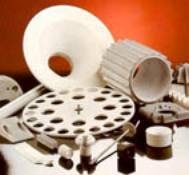Reaction bonded silicon nitride is made by heating a compact of silicon powder in a nitrogen gas atmosphere. Reaction starts at 1200 °C. The nitriding cycle is usually carried out at 1450 °C and takes between 150 and 200 hours. Nitrogen - hydrogen or nitrogen- hydrogen-helium gas mixtures are often used as they give faster and more easily controlled reaction rates and result in higher strength materials.
Reaction bonding enables the production of complex near net shapes. Although silicon expands by approximately 20% on conversion to the nitride, the expansion is accommodated with the void space of the silicon compact. There is little change in the overall volume of the components, accurately dimensioned shapes can be made without expensive and time consuming finishing operations.
Reaction bonded silicon nitride components have lower density than components made by hot pressing routes due to the difficulty in ensuring complete reaction throughout the volume of the silicon pack. As a consequence, RBSN components have inferior mechanical properties such as strength and Young’s modulus.
Key Properties
- Good thermal shock resistance
- Resistant to wetting by molten metals
- High electrical resistivity
- Low density
- High hot strength
- Mechanical fatigue and creep resistance
- Oxidation resistance
- Ability to be formed into complex shapes relatively easily
Table 1. Typical Physical and Mechanical Properties of Reaction Bonded Silicon Nitride
| Property |
Value |
| Density (g.cm-3) |
2.5 |
| Young’s Modulus (GPa) |
200 |
| Bend Strength (MPa) |
300 |
| Fracture Toughness K 1c (MPa.m0.5) |
2 |
| Hardness (GPa) |
10 |
| Thermal Expansion Co-eff., (x10-6)(°C) |
3.0 |
| Thermal Conductivity (W/m.K) |
10 |
| Decomposition Temperature (°C) |
1900 |
Applications
|

|
|
Figure 1. Various parts manufactured from RBSN (photo courtesy of CERAM Research Ltd).
|
Thermocouple Sheaths
Due to silicon nitrides’ good resistance to thermal shock and it resistance to wetting by molten metals, it is often employed as a material of choice for thermocouple protection sheaths, in particular for non-ferrous metal applications.
Nozzles
Internally threaded nozzles for inert gas welding and cutting torches are often made from reaction bonded silicon nitride due to its ability to resist thermal shock and molten metal attack.
Specialised Kiln furniture
Some specialised kiln furniture is made from silicon nitride due to its low thermal mass combined with its ability to resist thermal shock.
Other Applications
Reaction bonded silicon nitride is also used for fixtures to position and transfer metal parts for processes such as induction heating and resistance welding, brazing and soldering.
About Goodfellow

Goodfellow supplies metals, ceramics and other materials to meet the research, development and specialist production requirements of science and industry worldwide.
The Goodfellow group consists of four companies. The main administration, research laboratories and workshops are located at the Company's headquarters in Cambridge, England. The subsidiary offices in America, France and Germany provide an additional service.